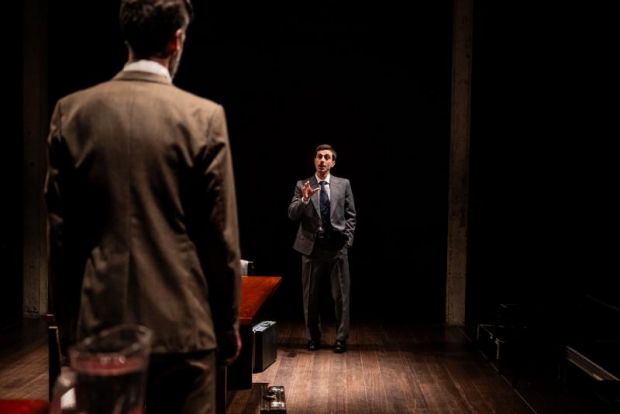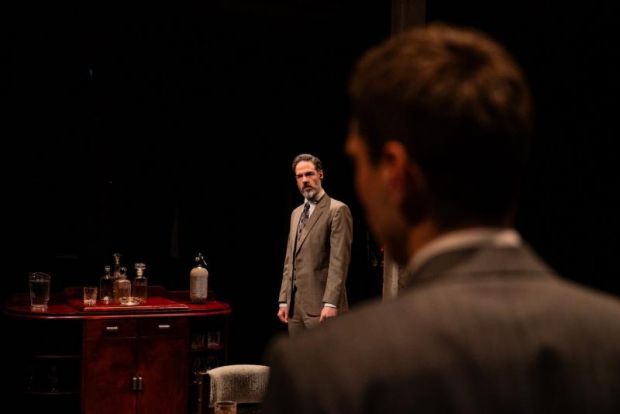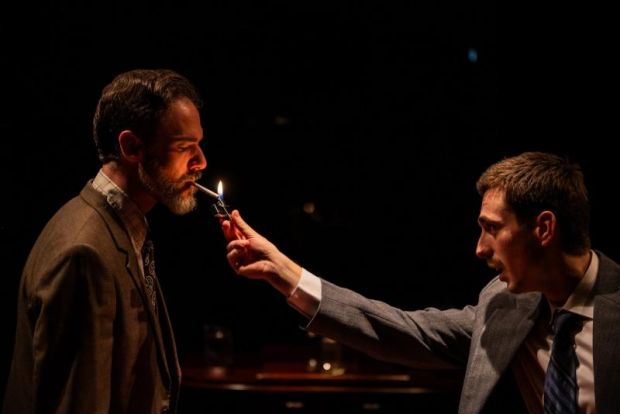Smokescreen
Christopher Samuel Carrol’s play is set in 1977, but it is just as much – if not more so – about now. As we pay close attention as Carroll’s tight, articulate, verbally dextrous dialogue, we may feel an increasingly chilling dismay. Smokescreen is about survival in business, about clever manipulation, blatant lying and a compliant, blinkered public.
Glenn (Christopher Samuel Carrol) is a Big Oil executive with a problem: how to go on selling, or convincing the public to buy, oil and all its associated products even though he now knows about the environmental damage done by fossil fuels. Perhaps hoping against hope – or giving way to some magical thinking - he calls in Bud (Damon Baudin), a smooth, no-frills marketing expert from the tobacco industry, to solve the dilemma.
Casting by director Carroll is skilful. As Glen, Carroll himself is older, taller, stronger, bearded, and better dressed than the slight, smaller, drab Bud, who has a rather silly thin moustache. The text and the performances – both are excellent - give these men – and us - just enough ‘character’ to make them more that cut-outs or ‘types. We learn very little about Bud except that he doesn’t smoke or drink himself and is highly regarded in his field – that’s why he’s there. At first, he’s not giving anything away. But he is quietly implacable.
Glen, meanwhile, is a heavy drinker, and his chain smoking has given him a cough that periodically renders him speechless and hardly able to stand. He has two daughters and is worried for their futures.

The bare set is supposedly a hotel room (Glen jokes that he wants this ‘meeting’ to be secret so they’re not meeting in some bar): a dining table, two chairs, a sideboard with well-supplied bar, lit rather mercilessly by Antony Hately and Ash Basham.
As the play proceeds, Bud’s cold, relentless logic and his low estimate of the intelligence and morality of the average guy exacerbates Glen’s anguish – and drives him to fury. Bud is so devastatingly frank. And Glen is trapped... It’s not that Bud is wrong – he’s just... just... Amoral?
Bud’s advice isn’t at all what Glen expected – but given Glen’s problem, it’s hard to say what he expected. The recommendations are counter-intuitive and – to ostensibly moral Glen – shocking. But they come straight from the tobacco playbook...

Carroll’s decision to employ the transverse setting means some dialogue gets lost to either side of the audience whenever the actors turn their backs, lessening the conflict. And that rather counters the ‘layered voyeurism’ that the playwright intends.
In its face-the-facts cynicism and male aggression – and anguish - Smokescreen feels like a mix of the darkest of Mad Men episodes and a hard-hitting David Mamet text in its intention to force us to look at a discomforting reality.
But the first section – or the set-up – is repetitious and we’re waiting for something to happen. Something certainly does happen: the power balance tilts and shifts and then we are held – and chilled – by what follows...

We can’t help thinking about our world now – when we continue to use and find new sources of fossil fuel despite the pious greenwashing and ‘awareness’ and promises. But what’s so strong about Smokescreen is that it goes beyond – or implies more – than the specifics of marketing fossil fuels (and cigarettes, still huge in 1977). It’s about the culture of lying in general, about our continuing preference for convenience and the excuses we make to maintain our freedom and the status quo. So, this powerful piece makes us squirm or maybe despair even while we admire its artistry and insight.
Michael Brindley
Photographer: Nicholas Robertson
Subscribe to our E-Newsletter, buy our latest print edition or find a Performing Arts book at Book Nook.

